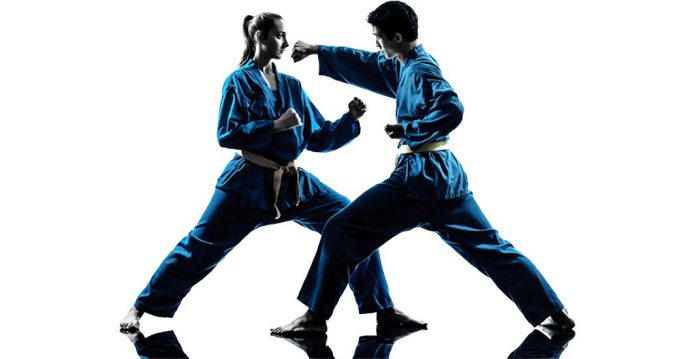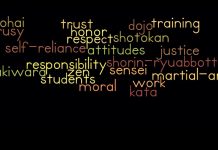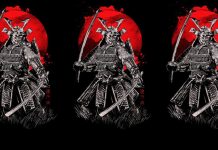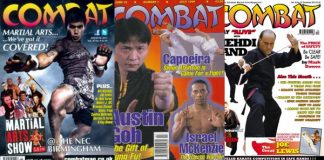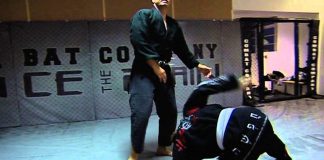In today’s hypercompetitive society, where everyone is trying to outdo someone else, these kinds of traditional martial art drills are the closest we can get to create an environment where cooperation comes first.
There is often criticism from the functional martial art community, specifically mixed martial arts, towards more traditional forms of martial arts training. In particular criticism is leveled towards the use of kata (Pre-arranged forms) and pre-rehearsed drills where you know exactly what your opponent will be doing. Your response towards your partners’ movement is often equally predictable. One-and-three step sparring is a good example of a prearranged drill.
This article is not really about arguing the lack of functionality of these kinds of drills in real martial art performance environments, but rather the positive benefits that many of the critics towards these training methods don’t understand. In addition this article is about highlighting the positive benefits that the people training these kind of drills experience but are probably totally unconscious of.
The question I have asked myself for some time,
“Even if these kinds of drills are not effective for real self-defense situations, why then are they so popular in martial arts training worldwide?”
Lets be honest kata and one-and-three step sparring are very popular. So many schools of martial arts use them. It is also not uncommon for many people with previous traditional martial arts training, on learning a more practical approach to martial arts, who still feel the need to continue doing their forms or prearranged drills. Most I have spoken too who feel this urge and have crossed over to MMA for example find it hard to explain why they feel this way.
As most functional performance based martial art coaches, I often thought to myself, “why would you still want to do something that is not performance based, even though you clearly now feel that what you are currently learning from me, is far more effective and practical?”
Criticism of what is widely termed ‘dead pattern’ training or what Bruce Lee called ‘swimming on dry land’ has been targeted towards the lack of functionality of these kinds of training methods and how most of them do not relate to real-world use. The bottom line of this argument is that someone who attacks you will never be predictable. Training therefore in a predictable manner sets you up for failure, because as all mixed martial artists know the only way to survive the unpredictability of a fight is to train it that way.
While these criticisms are valid, I feel that the critics of dead pattern training miss some very important, but yet crucial reasons why these training methods are so popular. In reality these reasons are not negative at all. Any good mixed martial art coach would take note of these reasons and find ways to make them available in a functional MMA environment.
I don’t believe people enjoy the pre-rehearsed partner drills or solo kata’s because of their supposed ability to enhance fighting skills. I believe that people practicing them have certain positive feelings and because they have these feelings when doing those activities, prescribe those positive feelings to it. I argue that the positive feelings people feel when doing kata or specifically pre-arranged partner drills have little to do with the ‘martial’ component of those activities- but more to do with what those activities represent psychologically and emotionally. It is really about how practicing those katas and prearranged drills make them feel. Again to reiterate most people are totally unconscious of this fact.
I believe the reason so many people enjoy pre-rehearsed partner drills for instance is because they are able to cooperate with a partner. In solo kata they love the feeling of self-challenge (Cooperation with oneself). The most important aspects of prearranged drills and kata is that they are not meant to be competitive (While I guess this may no longer be valid in the case of kata where you now see people competing in them. But not all people who train kata compete either. These are then the people I am talking about).
Both in kata and in prearranged drills with a partner one is required either to cooperate with oneself or with that partner you are working out with. Cooperation is about sharing skills. In order to be effective in these kinds of activities one is required to help each partner feel better about his performance. Because these drills need cooperation to work, by helping someone else achieve a certain outcome, we feel valuable and valued when our success is positively related to that of our partner (Kohn, p.108). Terry Orlick in Winning Through Cooperation, has come to an equal conclusion that, “experiences in human cooperation are the most essential ingredients for the development of psychological health” (Orlick, p.121).
According to David and Roger Johnson in their essay, The Socialization and Achievement Crisis, “cooperative learning situations, compared with competitive and individualistic situations, promote higher levels of self esteem and healthier processes for deriving conclusions about one’s self-worth”. One can easily conclude then why partner drills such as one-and-three step sparring that require people to work together and randori (no-kata) in Aikido are so popular. It is my view that they have little to do with the effectiveness of the ‘martial’ skill developed but more to do with how it makes each person feel when doing it. As pointed out by David and Roger Johnson, working together, the aspect of cooperativeness in the martial arts training environment builds a more positive sense of self-esteem and brings about a more accurate conclusion of ones self worth. It is therefore the very lack of ‘competitiveness’ in these traditional schools of martial arts when practicing these kinds of activities that creates such healthy psychological outlook in the participants.
Personally I have changed my mind about activities such as training kata or practicing prearranged set movements as long as it is understood in light of what I have written above. My only concern is when these kinds of activities are advertised as been good for self-defense. The reality is they are most definitely not.
I have a whole program I am intentionally developing to achieve the same positive psychological benefits that traditional forms of martial arts unintentionally create. My approach is still very much a performance-based environment and outcome. However I can totally understand why traditional martial art instructors continue to coach kata and one-and-three step sparring- simply because they can see the enjoyment on the faces of their clients (Even if they may be unconscious to the real reasons why!).
In today’s hypercompetitive society, where everyone is trying to outdo someone else, these kinds of traditional martial art drills are the closest we can get to create an environment where cooperation comes first. Personally if I had no other option, I much rather be teaching a traditional martial art approach than having to go night after night into an MMA/Boxing gym just to watch a bunch of testosterone filled youngsters all jostling for a position in a hypercompetitive environment or watching my back to make sure that my old broken body does not get torn apart.
Rodney King
For over a decade and a half Rodney King has coached world champion athletes to become the best they can be in the ring. He has consulted with Special Force Military Units on helping them define and implement a winning performance mental game for the battlefield. He has acted as a Performance Coach for countless CEOs, business leaders and inspiring entrepreneurs to find their center of power, manage their fears, anger and frustration and help them develop into Embodied-Warriors for the boardroom. As a Somatic Movement Educator and Martial Arts-Life Coach, Rodney offers a unique program of warriorship tools, grounded in training the body through martial arts to refocus the mind.
He lives in South Africa with his wife and two sons. You can visit Rodney at his personal website and home on the web at:
His personal website can be found at: www.martialartslife.com his CMD global program site at: www.crazymonkeydefense.com. Contact Rodney Rodney@crazymonkeydefense.com
References
Kohn, A (1992). No Contest: The Case Against Competition. New York: Houghton Mifflin.
Orlick, T (1978). Winning Through Cooperation: Competitive Insanity. Washington: Acropolis Books Inc.
Johnson, D. W., & Johnson, R. T. (1983) The socialization and achievement crisis: Are cooperative learning experiences the solution? In L. Bickman (Ed.) Applied Social Psychology Annual, 4. Beverly Hills, CA: Sage Publications.

